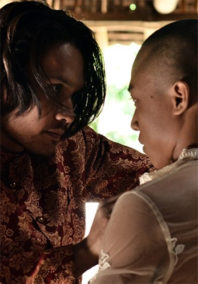
I’m starting to suspect that I like flashbacks in movies, but credit is due to an interesting story. Garin Nugroho’s Memories of My Body has Rianto telling a fictionalized version of his life. In this retelling, his name is Juno, and he divides his life into chapters. Those chapters show Juno’s early childhood (Raditya Evandra), adolescence (Endah Laras), and adulthood (Muhammad).
Rianto as a narrator is compelling. Imagine an intricate dance piece between every segment, capturing both Juno’s rage and grace. He makes the story physical, having more talent in his fingertips than most people have in their bodies. And the transitions between his narrations and the actual segments are fluid, as if transfiguring back and forth to his former selves.
It’s an honor to watch Rianto’s pieces. Most of the pieces tie back to how dance entered Juno’s life and affected his sexuality. Even his childhood is compelling, meeting a rural dance instructor who gave him a complex towards repression and pleasure. Throughout his life he meets other instructors and troupe leaders who aren’t the best people to be around.
Rianto and Nugroho also show how difficult it is for arts to prosper in a repressive country. But it’s not all that repressive, as troupes all over Indonesia, where he’s from, still teach and practice that art. The dance style he practices is a combination of contemporary and Lengger, its Hindu roots surviving in a country with secular Muslims.
This film also, without pretension, plays around with the theme of destiny. Juno’s full name is Wahyu Juno which comes from Arjuno, one of the princes in the Maharabhata. His early instructors instilled in him the idea that he has a larger and mysterious purpose. But as with most people, this shows that destiny requires a difficult yet worthy journey.
- Release Date: 6/1/

